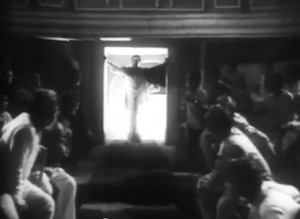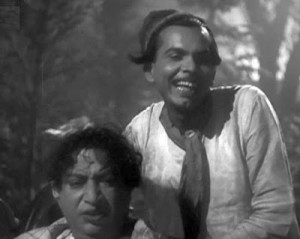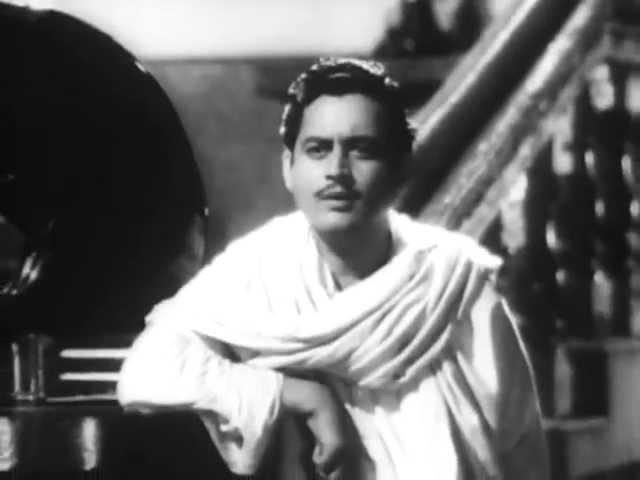A spurned lover lets loose a poignant evocation of his tryst with unrequited love. He does it in the house of a well-known publisher, Mr. Ghosh (Rehman), upon seeing the latter’s wife Meena (Mala Sinha), who once meant the world to him. Officially, he has been relegated by Mr. Ghosh — himself wary of the former’s covert countenance – to act as domestic help in a celebratory gathering of the city’s cognoscenti. Decrying the demise of integrity in true love when struck by the dreariness of materialism, he confronts the existential vacuum of regret, rejection and despair. His voice is sombre when he ardently declares – “Jaane woh kaise log the jinke pyaar ko pyaar mila” (I wonder who those people are who win the love they truly seek). The polished audience listens and absorbs – beguiled and perplexed – but is eerily muted in response. The esteemed gathering is aghast at encountering palpable flashes of raw truth through the very medium in which it asserts monopoly. All the hollow delusions it has latched onto are unsparingly revealed by the rather urbane recital of poetry coming from an inconceivable source. There is fleeting acknowledgement, but it is soon muffled in the deafening silence of apathy and self-absorption. In a gloomy trance, he continues to bare his soul in a profound, lyrical presentation of his poetry, unwary of public indifference.
The singular scene is from Pyaasa (“Thirst”; 1957), Guru Dutt’s surreal masterpiece in which he plays the passionate and vagrant poet, Vijay. It is a multi-layered accomplishment teeming with religious, political, social and nationalist themes — all tangled in a decadent urban milieu lurking beneath the lustre of post-Independence optimism. The film, unwavering in its conviction, culminates in the rejection of fame as an artifice invented by a flawed society which fails to recognise its true artists. Formerly written as Kashmakash (Conflict) during the tough days of personal struggle, it was drafted many times and altered throughout the course of the film’s production. Dutt teamed up with the poet Sahir Ludhianvi to get the right lyrics, using many of the latter’s existing literary pieces as references to create Vijay’s character and the tumultuous world around him. VK Murthy, his frequent collaborator since Jaal (1952), lent visual flair to the subject while SD Burman composed the songs and background score. With a perceptive amalgamation of lighting, close-ups, music and symbolic imagery, Dutt forged a unique, endearing aesthetic to reflect his rumination on romanticism.

Concerned with the erosion of humanity in an uncaring, deceptive world, the romantic poet eschews the role of an apologist and takes injustice head on. He has a singular weapon in his hand – the ability to wield the mighty pen. When he encounters a strange woman reciting his poems on the street, he is intrigued and follows her to ask how she found his verses, while trying to make sense of the inexplicable pull he feels towards his own creation. He is unmindful of the fact that the woman is importuning herself – ostracized by day yet amorously desired in the city’s nightscape. In Pyaasa, Vijay perceives Gulabo (Waheeda Rehman) not as a vicarious object of pleasure but an unblemished reflection of his own self. Gulabo begins to bracket the intricacies of Vijay’s poetry with the arduous quest for her own meaning, as she struggles to build an emotional edifice for herself. When she discovers that the penniless pursuer she turned away was none other than her cherished poet, she decides to make amends by empathizing with his inner crisis.
Driven out of his own house by the asperities of disowning brothers, Vijay is deep in despair and penury. Guru Dutt makes evident his initial preoccupation with a nihilist theme central to almost all his films post Pyaasa – annihilation of the Self. He understands this theme as being an ambivalent emotion, almost nascent in a perceptive protagonist. Vijay drowns his misery in alcohol, aimlessly mingling in dens of vice – places where even the most ardent chauvinist is a slave of amorous desire. Even here, Vijay cannot detach himself from his inherent cognizance. His gift of creativity is now a curse as he embroils himself in the haunting dystopia of a red light district. His observations are more than words of description, questioning the very ideas of patriotism, dignity and morality – all vanish when bruised souls inhabit young, hapless bodies peddled as property. The wailing of a hungry infant in one of the brothels is also muffled so that a dance performance by his mother may continue unhindered. Vijay can bear no more, and he unleashes his own conscience upon the insidiousness around him.
Abdul Sattar (Johnny Walker), a nonchalant, quirky, Sufi-ish and peculiarly forthcoming oil masseur, acts as a foil for Vijay’s more brooding stature. Their light exchanges are simmering with age-old conflicts of ways to live life – pine for truth at the cost of sinking in the ocean, or just keep on sailing gleefully till you reach land. Sattar zestfully advocates the latter as he struts around touting the virtues of his trade, in a poem written again by Vijay. Abdul Sattar’s character is not mere happenstance but represents the other side of the coin – not the counterfeit handed to Vijay in return of porter services, but the currency which keeps both Sattar’s visceral joy and Vijay’s cerebral anguish going. Sattar also proves to be of help when he engineers Vijay’s escape from a ghastly prison meant for the mentally ill, incarcerated by falsely being declared an imposter. Having seen and nearly felt the palpable quagmire of true insanity, Vijay decides to unmask the ailing face of society. Rejecting Sattar’s cheeky call for buoyancy, he is emboldened to carry on his quest alone. He leaves for the auditorium where his allegedly posthumous works are being publicly honoured for profit.

As the ultimate betrayal of his own kin and those around wound him, Vijay rejects the world and all that comes with it in a climactic sequence reminiscent of crucifixion. The usage of lighting, long shots and space as distinct structural elements, rhythmically entrenched in music evoke shades of the surreal. “Ye duniya agar mil bhi jaye toh kya hai” (Even if the duplicitous world hails me and my work, I will reject it) – a point-blank refusal to blind oneself with illusions of a hypocritical people, forms the pivot of the film.
At this juncture of the narrative, Dutt embraces the core of romanticism. He also uses melodrama with flair, underscoring crucial emotions dictating essential character graphs. He reveals his protracted sensibilities for the audience within and without. The audience in the film, however, is unable to forego the intangible shackles their poet mightily rejects, and becomes prone to impulse, soon descending into a chaotic state. The erstwhile patrons of literature are now a delirious mob when their beliefs are attacked.
Gulabo is the only member who has finally redeemed herself as she beholds Vijay’s purity and poise. Her tears betray a freedom she has seldom felt before. As Vijay decides to severe his tether to materialism, he seeks out Gulabo – the only woman who can be his anchor, a soul longing to give life meaning. As darkness engulfs the homeless on the streets once again, he construes her to be an embodiment of his own struggle in the search for enduring authenticity. They proceed hand in hand, walking towards the setting sun.
It would be years before Pyaasa would be resurrected from the annals of Hindi cinema, freed of its ‘provincial,’ mainstream character and exalted to the pedestal of a classic. Its creator’s unfortunate demise had left behind an everlasting thirst for self-expression and an unwavering love for filmmaking. His command over the language of cinema has been consistently praised ever since, and his deep understanding of human emotion is cathartic to many a discerning viewer.
Pyaasa remains etched in the memory of all those who have experienced its sheer beauty – not lush, ornate scenery but a fearless, humble poet wafting through urban shadows, transcending space and time.
By Pranav Joshi
A final year computer engineering student who is also a voracious consumer of cinema.







Leave A Comment
You must be logged in to post a comment.